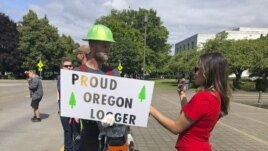01 July, 2019
Americans are divided on the issue of climate change. This divide is most apparent in Oregon, where state lawmakers had been considering a climate bill.
On one side are lawmakers representing cities, where many of the state's liberals live. On the other side are lawmakers from conservative and economically depressed rural areas.
Recently, 11 members of Oregon's state senate led a nine-day walkout to deny the number of lawmakers needed to vote on the climate bill.
All 11 members belong to the Republican Party. Nine of them returned to the state senate on Saturday after learning that Democratic Party lawmakers did not have enough of their own votes to pass the bill.
On Saturday, senators voted 17-10 to kill the measure.
Most Senate Democrats had supported the bill. Its aim was to cut production of carbon gases. The measure would have been the second law of its kind in the United States.
Actions surrounding the climate bill speak to larger political issues taking place in Oregon.
The climate bill story has received international attention, in part because some militias have supported the Republican senators.
Oregon's political divisions
Experts say the senate protest was unavoidable given the state's political divisions.
In recent years, Oregon has been known nationally as a liberal state. But though its cities are liberal, about 40 percent of people always vote Republican. Those voters live mainly in rural areas, says Priscilla Southwell, a professor at the University of Oregon.
"The reality is that it is a much more divided state than people realize," she told The Associated Press (AP).

FILE - In this Thursday, June 20, 2019, file photo, a TV reporter interviews self-employed logger Bridger Hasbrouck, of Dallas, Ore., outside the Oregon State House in Salem, Ore.
That political divide is also causing an economic divide. The city of Portland has grown, but huge parts of the state do not have enough money to keep public libraries open or staff police departments.
Logging was historically one of Oregon's most profitable industries. But the industry has experienced cuts as a result of environmental restrictions and a changing world economy. Rural voters worried the climate legislation would cause the end of logging and trucking.
Bridger Hasbrouck is a self-employed logger in Dallas, Oregon. He said the climate bill would "ruin so many lives" and "put so many people out of work." He told the AP that if the people he works for lose too much money, he would have to find different work.
The climate bill aimed to reduce carbon over 30 years by setting a limit on total carbon pollution and making companies buy or trade "allowances" within that limit. The method is known as cap and trade.
Democratic Senator Sara Gelser said the bill had taken many years to develop. She added that many Oregonian voters are unhappy with its defeat.
Senate Democrats said the legislation was critical to give Oregon a lead in the fight against climate change. They also said it would create jobs in the long-term and improve the economy.
Senate Republicans said the bill would kill jobs, raise the cost of fuel and other goods and hurt small businesses. They also said they had been left out of policy negotiations, a claim the governor denies.
Chris Shortell leads Portland State University's political science department. He said rural Oregonians feel their problems are not being heard but wrongly blame climate legislation. He offered such examples as militia groups like the Oregon Three Percenters.

In this photo taken June 21, 2019, people demonstrating to raise awareness of climate change blocked streets in downtown Portland, Ore.
Some worry the state's climate divide could incite an anti-government movement in Oregon, like that of three years ago. In 2016, two militia members put together an armed takeover of the Malheur National Wildlife Refuge.
In the recent political crisis, one militia group had offered to act as security to Republican senators. The Capitol was temporarily closed because of what police said was a real "militia threat."
Eric Ward leads the Western States Center, a nonprofit group. He said extremist groups have expanded in Oregon over the past five years as rural voters grow more hopeless.
Ward said there are organizations and people who are taking leadership. "But that leadership is led by ... bigotry and threats of violence."
Patty Limerick is with the Center of the American West at the University of Colorado, Boulder. She said that, over the past 50 years, the rural U.S. West has seen big changes, such as federal protections for forests and animals.
Limerick added that sometimes, such big changes take time for people to accept. "And sometimes it takes a couple of centuries."
For now, it's unclear what will happen next.
I'm Bryan Lynn. And I'm Alice Bryant.
This story is based on reports from The Associated Press (AP) by Gillian Flaccus, Andrew Selsky and Sarah Zimmerman. Alice Bryant adapted the reports for VOA Learning English. George Grow was the editor.
_____________________________________________________________
Words in This Story
walkout – n. the act of leaving a meeting or organization as a way of showing disapproval
staff – n. a group of people who work for an organization or business
logging – n. an industry that cuts down trees in an area for wood and paper products
allowance – n. an amount of something (such as time) that is allowed or available
bigotry – n. beliefs or acts of a person who hates or refuses to accept the members of a particular group of people